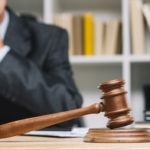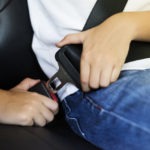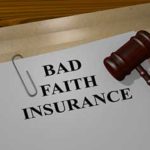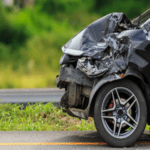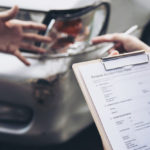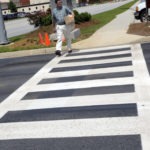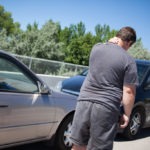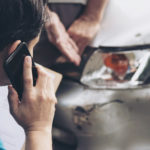Admitting Fault in a Car Accident – Do’s and Don’tsWhen a car accident occurs, the big question is who is at fault. The party responsible for the accident must pay damages to the victim.
How do you ensure that your rights are protected? What do you need to know when investigating fault after a car accident? Our car accident lawyers explain.
Here are 10 Do’s and Don’ts for admitting fault in a car accident:
1. DO – Understand that what you say can be used against you.
When you’re in a car accident, the things that you say can be admissible if your case goes to court. California law creates exceptions to the hearsay rule. One of the exceptions is for statements offered by someone who is a party to legal action. In other words, things that you say to others at the scene of the accident can be used against you.
The same is true for things you say to the insurance adjuster, your friends and investigators. You may mean something innocently, but it can be taken out of context. Know that others are listening to what you say very carefully. Your statements can be used against you when it comes to determining fault in a car accident.
2. DON’T – Assume you know what qualifies are legal fault
You may want to say that you’re sorry after an accident. You may even think that the accident could be your fault. However, legal fault isn’t always obvious.
There may be reasons that the other party is at fault for the accident that you’re not aware of. There may even be parties besides the driver, like an employer or a vehicle manufacturer, who are at fault that you’re not thinking about right now. An experienced car accident attorney can help you determine what qualifies as legal fault and who may have blame for the accident.
3. DO – Investigate
Fault isn’t always obvious immediately after the accident. You may need to talk to witnesses, find any video that may exist, examine damage and do accident reconstruction. It can be tempting to want to know fault as soon as the accident happens, but it may not be clear. Take a deep breath and give yourself time to conduct a thorough investigation before making any conclusions.
4. DON’T – Offer too much information to the insurance company
The insurance adjuster may seem friendly. They may ask for a lot of information. However, an accident is an upsetting event. You may be emotionally distressed. You may not understand the full extent of your injuries.
Once you say something to the insurance company, they can use it against you. If you have injuries, start by telling the insurance company that they’re being evaluated and treated. Don’t offer definitive information until you know the whole story.
5. DO – Understand comparative fault
If you have some fault for the accident, all is not lost. You may still deserve some financial compensation. California uses a system of pure comparative fault. Even if you’re 99% to blame, you can still recover for the 1% that someone else is at fault for the accident.
Comparative fault looks at all the possible causes of the accident. It apportions blame and financial compensation based on the causes of the crash. Even though your compensation may be reduced, it may still be worthwhile to bring a claim. Comparative fault can play into a settlement. If the case goes to trial, the jury can apportion fault and along with it, damages to each injured party.
6. DON’T – Stop at proving fault
To receive financial compensation for an accident, you must prove fault. Someone else must have negligently, recklessly or intentionally caused the accident. However, fault isn’t the end of the story. It is just one of the elements that you must prove to win your case. Be sure to gather proof of every element including causation of injuries and the amount that you deserve in damages.
7. DO – Understand the formal discovery process
As you move through the litigation process, you may encounter formal discovery. The other side may ask for admissions, ask that you answer interrogatories or send a notice for a deposition. You can make these demands, too.
You must complete these requests, and you must answer honestly. An experienced attorney can help you understand how to best respond in a way that complies with legal requirements and protects your interests. They can help you prepare for a deposition and other proceedings by ensuring that you understand what’s being asked and that you only answer the question directly asked.
8. DON’T – Go by the police report alone
A police report is a helpful tool in an accident investigation. But it is not the only say. In the end, a conclusion in a police report is the officer’s opinion. They are not the final authority in who has fault for an accident.
You can use the police report for the information in it including identification of parties and witnesses. It can give a brief synopsis of what may have occurred. However, don’t rely on it alone to determine fault.
9. DO – Learn about negligence per se
If a driver violates a traffic law, there’s a high likelihood that they acted negligently. The rule is called negligence per se – it’s presumed to be negligence if you violate a rule of the road that is meant to protect others. It’s possible to be negligent without expressly breaking a traffic law. However, negligence per se can be a starting place to look for fault.
10. DON’T – Go it alone! Work with an experienced car accident attorney
Fault can be hard to determine after a car accident. But without having proof of fault, you have no case. An experienced attorney can help you determine fault. They can sort complex issues like comparative fault and negligence per se. They can help you understand how to prove your case and maximize your compensation. Plus, they can speak to the insurance company on your behalf.
Attorney for Determining Fault in a Car Accident
Do you have questions about fault in a car accident? Our attorneys can help. Let us help you examine the multiple factors that can play a role in determining fault.
We can utilize our experience to prove your case and maximize your compensation. Call or message us today for your consultation.









